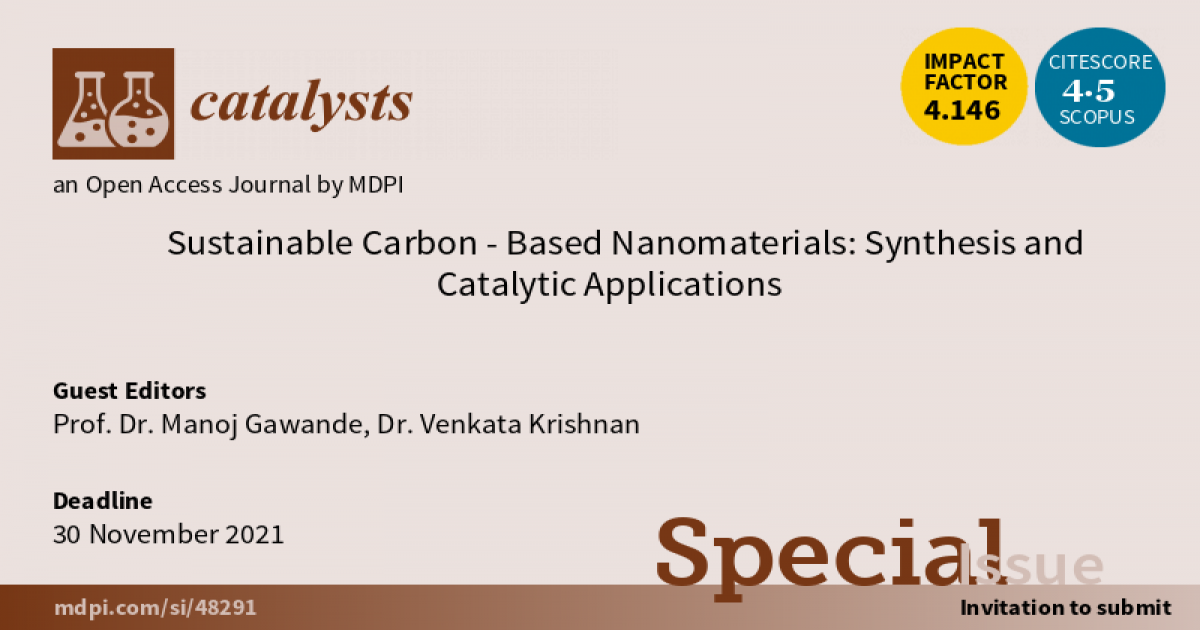Sustainable Carbon-Based Nanomaterials: Synthesis and Catalytic Applications
A special issue of Catalysts (ISSN 2073-4344). This special issue belongs to the section "Nanostructured Catalysts".
Deadline for manuscript submissions: closed (30 November 2021) | Viewed by 570

Special Issue Editors
Interests: nanocatalysis; 2D cabon nanostructures; biomass; green synthesis; benign reaction technologies
Special Issues, Collections and Topics in MDPI journals
Interests: bioinspired materials; photocatalytic materials; carbonaceous materials; defect engineered materials; two dimensional (2D) materials; organic transformation reactions
Special Issues, Collections and Topics in MDPI journals
Special Issue Information
Dear Colleagues,
Sustainable carbon-based materials/nanomaterials have recently been the focus of increasing attention as highly functionalized nanomaterials/nanocatalysts in miscellaneous applications including hybrid graphene nanocatalysts, carbon materials, carbon-based single-atom catalysts, nanodiamond materials, N-doped carbon materials, carbon nitrides, and other advanced carbon nanostructures. These materials have seen tremendous growth in recent decades for their use in the development of sustainable carbon-based nanomaterials. Specifically, these carbon nanomaterials can now be tailor-made with superior precision with preferred catalytically active sites and they can be prepared in a more benign fashion with well-defined sizes, shapes, crystal facets, structure, and composition. Such controllability could possibly lead to advanced catalytic/photocatalytic/electrocatalytic/energy/environmental technologies and their other important applications. Besides, the outdated need for effective and selective catalytic transformations that will transform raw materials into valuable chemicals, pharmaceuticals, and fuels. This Special Issue will highlight key examples of advanced carbon-based nanomaterials/materials with applications in various important catalytic, photocatalytic, energy, environmental, and electrocatalytic applications.
Dr. Manoj Gawande
Dr. Venkata Krishnan
Guest Editors
Manuscript Submission Information
Manuscripts should be submitted online at www.mdpi.com by registering and logging in to this website. Once you are registered, click here to go to the submission form. Manuscripts can be submitted until the deadline. All submissions that pass pre-check are peer-reviewed. Accepted papers will be published continuously in the journal (as soon as accepted) and will be listed together on the special issue website. Research articles, review articles as well as short communications are invited. For planned papers, a title and short abstract (about 100 words) can be sent to the Editorial Office for announcement on this website.
Submitted manuscripts should not have been published previously, nor be under consideration for publication elsewhere (except conference proceedings papers). All manuscripts are thoroughly refereed through a single-blind peer-review process. A guide for authors and other relevant information for submission of manuscripts is available on the Instructions for Authors page. Catalysts is an international peer-reviewed open access monthly journal published by MDPI.
Please visit the Instructions for Authors page before submitting a manuscript. The Article Processing Charge (APC) for publication in this open access journal is 2200 CHF (Swiss Francs). Submitted papers should be well formatted and use good English. Authors may use MDPI's English editing service prior to publication or during author revisions.
Keywords
- Graphene-based nanomaterials
- Cabon-based nanomaterials
- N,S,O-doped nanocatalysts
- Electrocatalysis
- Photocatalysis
- Energy applications
- Environmental remediation
Benefits of Publishing in a Special Issue
- Ease of navigation: Grouping papers by topic helps scholars navigate broad scope journals more efficiently.
- Greater discoverability: Special Issues support the reach and impact of scientific research. Articles in Special Issues are more discoverable and cited more frequently.
- Expansion of research network: Special Issues facilitate connections among authors, fostering scientific collaborations.
- External promotion: Articles in Special Issues are often promoted through the journal's social media, increasing their visibility.
- e-Book format: Special Issues with more than 10 articles can be published as dedicated e-books, ensuring wide and rapid dissemination.
Further information on MDPI's Special Issue polices can be found here.






